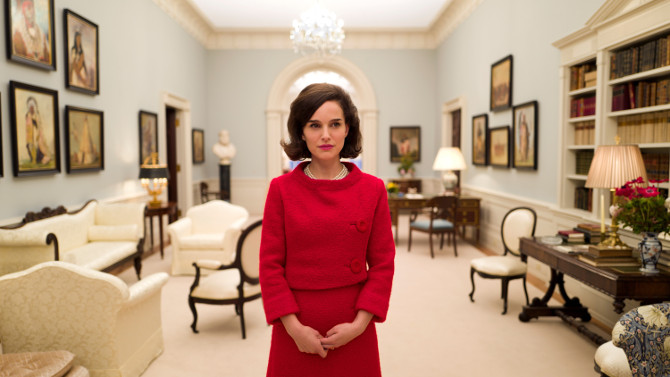Unfurling the story that takes place immediately after the assassination of John F. Kennedy, 2016’s Jackie is an intimate portrayal of a woman in a dreadfully surreal crisis.
Delving into a horrifically memorable moment from the past that has seemingly been looked at in every which way, Jackie succeeds at developing a multilayered story that goes beyond the surface, and thought-provokingly brings up questions of fact versus fiction, history versus myth/legend, idealism versus realism, as well as finding stark stoicism in the face of unimaginable horror.
And horror it is, as director Pablo Larraín weaves together multiple threads that create a somber, melancholic mood that teeters on realistic dread, dismay and terror. It is something that is hard to fathom – as it is unbelieve to imagine that any of us will ever experience such a dreadful incident that is then followed by overwhelming media attention and scrutiny. Though vulnerable, our main character is able to steady herself, finding a poised grace in order to stand strong, being a calm, enduring, mother-like figure that will help guide the nation through one of its darkest hours.
Natalie Portman plays the titular character, the private First Lady to the charming, charismatic JFK (Caspar Phillipson). Jackie is no slouch; she is an integral part of the power couple that built the idealistic vision of The White House which was coined (after the fact), for their short reign, as Camelot.
Fusing together the fateful events of that day (with her planning for her beloved husband’s funeral) with an interview she gives to a journalist (Billy Crudup), as well as footage from a feature she did on the renovations she spearheaded in the White House, and finally a lengthy conversation she has with her priest (John Hurt), Larraín is able to juggle the monumental task, visualizing the shock, disbelief and internalized pain simmering just below the surface of this iconic woman. The story also transcends this, as we watch the strength and resilience of the human spirit as she ignores her private tendencies and looks to the future in order to immortalise the Kennedy legacy. Each moment has its highlights: the funeral is about finding solace, standing up in the face of evil – even when we are afraid, as well as creating a moment that will last in a nation’s collective psyche; her frank, revelatory comments about her husband (that are never going to air in the article the journalist is writing) speaks to the complexities of a political marriage; Jackie’s vision of The White House reiterates her ideas on remembering the past, leaving a lasting memory and building for the future; the confused pain and anguish she feels is put into perfect context by the wise old priest who tries to ease her burgeoning, shock-riddled mind.
This idea of memory (mentioned in the above paragraph) also plays a big part. How do you form a legacy and leave a lasting impact (à la Abraham Lincoln), compared to two other assassinated Presidents: James Garfield and William McKinley – who have been, more or less, lost to time?
The score, composed by Mica Levi, is superlative. Like a play on an historic American tune, it is reworked into a simplistic sigh downward, capturing the way in which your spirit and soul can drop in an instant. It is moving, emotive and transcendent, perfectly capturing the intense, depressing and stirring moments found onscreen. With lengthy stretches with no dialogue, her score carries us through multiple levels of emotion as we watch sharp images onscreen. Levi is wholly deserving of the Academy Award nomination she received for her work.
An intriguing look at a dark three days in American history, Jackie is a clever film that will leave you talking. Its themes are heady, performances are strong (Portman is one of the five nominated for Best Actress at this year’s Oscars; Hurt is another standout in one of his last performances), and subject matter bold. Despite covering a topic that has been tackled before, it finds new information to convey, and is delivered in a way that imparts an eerie emotion that is hard to ignore. Despite the grave subject matter, get an inside look into the famous First Lady as she charters the course of history and legacy for future generations.


I really didn’t want to watch yet another iteration about the JFK murder, and I honestly didn’t think I would buy Natalie Portman as the inimitable Jackie Kennedy; by the end of the movie she had won me over and I have to admit that I did enjoy this movie experience, though all too familiar with the ending.